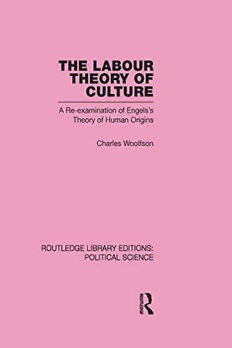
The Labour Theory of Culture: A Re-examination of Engels's Theory of Human Origins PDF
Preview The Labour Theory of Culture: A Re-examination of Engels's Theory of Human Origins
ROUTLEDGE LIBRARY EDITIONS: POLITICAL SCIENCE THE LABOUR THEORY OF CULTURE THE LABOUR THEORY OF CULTURE A Re-examination of Engels’s Theory of Human Origins By CHARLES WOOLFSON Volume 42 First published 1982 This edition first published in 2010 by Routledge 2Park Square, Milton Park, Abingdon, Oxon, OX14 4RN Simultaneously published in the USAand Canada by Routledge 270 Madison Avenue, New York, NY10016 Routledge is an imprint of the Taylor &Francis Group, an informa business ©1982 Charles Woolfson All rights reserved. No part of this book may be reprinted or reproduced or utilised in any form or by any electronic, mechan- ical, or other means, now known or hereafter invented, including photocopying and recording, or in any information storage or retrieval system, without permission in writing from the publishers. British Library Cataloguing in Publication Data Acatalogue record for this book is available from the British Library ISBN 10: 0-415-49111-8 (Set) ISBN 13: 978-0-415-49111-2 (Set) ISBN 10: 0-415-55583-3 (Volume 42) ISBN 13: 978-0-415-55583-8 (Volume 42) Publisher’s Note The publisher has gone to great lengths to ensure the quality of this reprint but points out that some imperfections in the original copies may be apparent. Disclaimer The publisher has made every effort to trace copyright holders and would welcome correspondence from those they have been unable to trace. The labour theory of culture a re-examination of Engels's theory of human origins Charles W oolfson Department ifS ocial and Economic Research University ifGlasgow Routledge & Kegan Paul London, Boston and Henley First published in 1982 o/ Routledge & Kegan Paul Ltd 39 Store Street, London WC 1E 7DD, 9 Park Street, Boston, Mass. 02108, USA and Broadway House, Newtown Road, Hen ley-on-Thames, Oxon RG9 1E N Photoset in 10/12 point Baskerville o/ Saildean Limited, Surrey and printed in Great Britain l!J Ebenezer Baylis & Son Ltd, Worcester @ Charles W oolfson, 1982 No part of this book may be reproduced in any jo1m without permission .from the publisher, except for the quotation of brief passages in criticism Library ofCongress Cataloging in Publication Data Wooljson, Charles, 1946- The labour theory ofc ulture. Bibliography: p. Includes index. 1. Communz~~m and anthropology. 2. Human evolution. 3. Labor and laboring classes-History. 4. Engels, Friedrich, 1820-1895-Anthropology. I. Title. HX550.A56W66 306 81-19960 ISBN 0-7100-0997-6 AACR2 For John Foster and William Coyle Contents Acknowledgments Vlll Introduction 1 1 Engels and human origins 5 2 The fossil record 11 3 Hunting and gathering 23 4 Primate tool-use and tool-making 34 5 Primate communication and culture 44 6 Theories of language origins 55 7 Labour and culture 67 Conclusion 79 Appendix: diagram of the interconnected processes of hominisation through labour 81 Notes 82 Bibliography 104 Name index 117 Subject index 119 Acknowledgments The following people provided helpful comments and suggestions: David Hamilton, Bridget Fowler, Barbara Littlewood,John Hoff man,Jeffrey Weeks, Henry Mins and Bruce Trigger. Kathleen Clark typed and retyped more times than she probably cares to remember. Despite the inevitable selectivity in this brief text, the writer sincerely hopes that he has not misrepresented the views of those whose work has been cited. Vlll Introduction What is surprising, given the concern of Marxist theory with the issue of human development, is the almost total neglect by Western Marxists of recent advances in archaeology, palaeontology, linguis tics and such related fields as primatology and anthropology, all of which have raised new and important questions concerning the very origins and nature of the human species.1 Despite an increasing penetration of Marxist ideas in some quarters, little has been said by Marxists about the emergence of early human beings since Engels attempted to outline the unique path of progressive evolutionary advance towards humankind from our anthropoid ancestors in a brief unfinished essay, written in 1876, entitled 'The Part Played by Labour in the Transition from Ape to Man'.2 Until very recently, only a handful of scholars have attempted to pursue a materialist interpretation of human development of the kind advanced by Engels.3 Yet Engels's essay raises an issue central to the whole premises of Marxist theory, namely the formative role of labour in human development and the genesis of human culture. Nowadays the work of Engels, when not simply ignored, is otherwise subjected to vigorous attack.4 Presumably this is intended in part to prove yet again that all the blame for the dogmatic and mechanistic 'errors' of Marxism should be laid at the door of Marx's co-worker and not at that of the 'great man' himself. Thus rid of the ballast of Engels, Marxist theory can float even higher in the rarified atmosphere of theoreticism. It is time, however, to come down to earth- and in the most literal sense. In the last two decades exciting evidence concerning the birth of humanity has been dug out of the soil and rock faces of Europe, Africa and Asia. Moreover, in scientific laboratories and in the field, experiments and observations of animal behaviour, including that of our nearest primate relatives, have revealed wholly unexpected patterns of behaviour with 1
